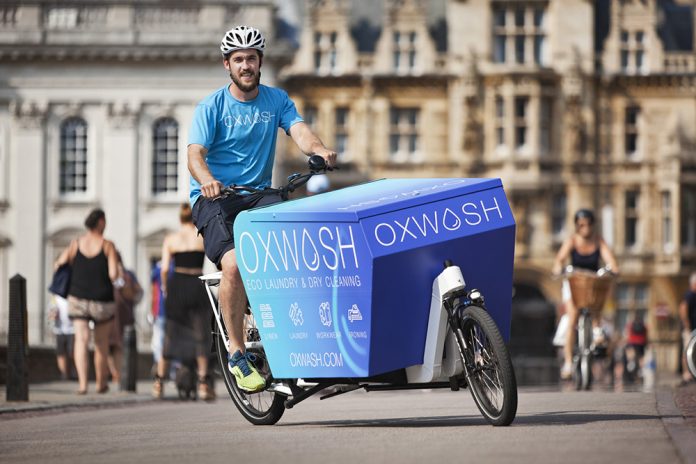A Cambridge eco-cleaning company has put the traditional laundry industry in a spin.
Using space-age technology, green tech start-up Oxwash has set its sights on decarbonising the toxic washing and dry cleaning sector.
Oxwash was founded in 2018 by ex-NASA scientist and Forbes’ Europe’s 30 under 30 alumni, Dr Kyle Grant, and Oxford engineer Tom de Wilton.
Kyle was still at university, finishing his Synthetic Biology PhD, when he and Tom launched a cleaning service for students – born out of frustration at constant washing machine breakdowns on campus.
Together, the pair re-engineered the cleaning process using technology more typically seen in space and hospital sterilisation, before setting up washing facilities (known as lagoons) in Cambridge, London and Oxford.
The UK’s industrial laundry sector currently processes over 743,000 tonnes of laundry every year, with the nation’s households using a collective 360 billion litres of water (equivalent to Lake Windermere) just by sticking a wash on at home. The Oxwash team is determined to help clean up the sector’s unsustainable working practices.
Kyle explained: “Our team is not only developing chemistry that works at 20˚C better than at 40˚C or higher, but we have integrated water reclamation and reduction technology into our process that saves up to 60% of the water consumption versus you washing at home or any other typical commercial washing service.”
Their cleaning process uses ozone (generated by renewable electricity) and biodegradable disinfectants to sterilise fabrics at lower temperatures, achieving higher than medical-grade disinfection. Such tech is typically only used in hospitals and spacecraft!
Cold water is used during wash cycles to cut down on energy bills, while water from a rinse cycle is put into the next wash cycle, saving up to 60% in traditional consumption.
Heavily stained clothes are blasted with compressed air and water, negating the need for heavy chemicals, and micro-plastics and fibres are filtered, capturing 95% of shed materials before they disappear down the drain as pollutants.
The team also use dissolvable laundry bags, and electric cargo bikes for ‘hyper local’ pickups and deliveries.
Oxwash’s sustainable business model – online bookings, bike collection, eco washes and drop-off – has proved so successful that growth has jumped 15% month on month since the start of the pandemic. And their on-demand service offering is attracting eco-conscious investors such as Twitter co-founder Biz Stone, and angel investors like Magnus Rausing of Tetra Park and Kal Patel, ex-CEO of Best Buy.
Speaking after a crowdfunder last winter raised £500,000 in 15 hours, Dr Grant said he was totally blown away by the level of interest. “Our goal was to build a wide network of shareholders who care about our purpose as much as we do, and can be true ambassadors for the brand, which is why we capped the investment level at £5,000 per person.”
He added: “We know being just another laundry app won’t cut it. Developing a model that is hyper local, carbon neutral and tech enabled, that reverses the sector’s adverse impact on the planet rather than adding to it, is absolutely critical.
“Partnering with the likes of Reckitt, The Oxford Foundry and Founders Factory, as well as being part of the Collective Impact programme with Virgin StartUp has given us access to some of the best minds in business which has undoubtedly been a leg-up for the business.
“There is a growing awareness and appetite for green washing services – and we’re confident that Oxwash can clean up and deliver substantial returns.”
Looking to the future, the ‘green cleaning’ market is expected to reach over $11 billion by 2029, so Oxwash is currently developing a modular, rapidly scalable model for cities across the UK and overseas.
And with 8000 individual customers, corporate clients like the Marriott Hotel Group, the NHS, the Astrazeneca Vaccine Trial and Peloton, plus a host of top-level investors on board, Oxwash looks to have hit the right cycle at the right time.





